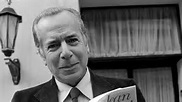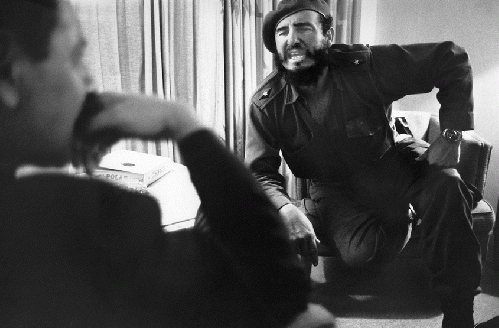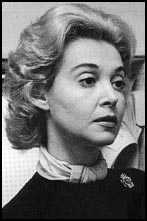Three Interviews With Castro
The relatively recent death of French journalist Jean Daniel made me think of the extremely significant interview he had with Fidel Castro at the very moment news of the assassination reached them, and Daniel's description of his response, which he published in a series of articles in the New Republic Magazine.
When President Kennedy learned that Jean Daniel was in Washington DC and was about to go to Cuba to interview Castro, JFK summoned Daniel to the White House and gave him a briefing on what he wanted Castro to know, which actually was the ending of a series of back channel communications with Castro that played a major role in the assassination of the president.
Fidel Castro Reaction to Kennedy Assassination in Cuba | The New Republic

Jean Daniel
More on Jean Daniel Bensaid
Jean Daniel
peaceful-revolution.jpg (300×184)
New York Times Obit
Jean Daniel, Leading French Journalist and Humanist, Dies at 99 - The New York Times
Besides Daniel, two other journalists had interviews with Castro that are primary sources for anyone interested in knowing what really happened at Dealey Plaza. Daniel Harker was an Associated Press reporter who got an exclusive interview with Castro at a reception at the Brazilian embassy the day after a CIA agent met with Rolando Cubella (aka AMLASH) in Brazil and attempted to get Cubella to kill Castro.
The story that Harker wrote was published in a New Orleans newspaper that Lonesome Assassin accusers say Oswald read and provided a motive for him to kill Castro.

The article quotes Castro as railing against the USA for sending CIA trained anti-Castro commandos to Cuba to attack economic targets, as well as for threatening the lives of Cuban leaders.
You have to read the whole article to recognize its significance and not just the quote Oswald accusers use to try to establish motive.
Harker wrote: "Bitterly denouncing what he called recent U.S.- prompted raids on Cuban territory, Castro said: 'We are prepared to fight them and answer in kind. United States leaders should think that if they are aiding terrorists plans to eliminate Cuban leaders, they themselves will not be safe.'”
Those who say this provides a motive for Oswald to kill JFK on Castro's behalf fail to provide evidence Oswald even read the article.
They also fail to recognize that Castro is "bitterly denouncing what he called recent U.S. - prompted raids on Cuba," raids officially approved by the National Security Council and run out of the JMWAVE bases in Florida. These same raids were also mentioned in both communist publications Oswald is holding in the backyard photos.
In addition, holding his talk at the Brazilian embassy was certainly a message that Cubella, who had met with the CIA agent in Brazil the day before, was a double agent reporting directly to his old friend Castro, as many CIA counter-intelligence officers believed at the time. Desmond FitzGerald, who had taken over the Cuban desk at the CIA from William Harvey, continued to meet with Cubella, and a CIA agent was meeting with Cubella in Paris, encouraging him to kill Castro, when JFK was assassinated.
Cubella was a founder of the DRE - Student Revolutionary Directorate in Havana when Batista fled, and took over his desk and smoked his cigars while Castro was marching towards Havana. And it was the DRE in New Orleans who Oswald tried to infiltrate, gave them his USMC training manual, and then got into a street fight while giving out Fair Play for Cuba Committee (FPCC) leaflets at the International Trade Mart.
Cubella had an apartment in Veradero overlooking the street Castro had to take to get to Xandu - the Dupont family's resort that Castro frequented, and where the JMWAVE Pathfinder sniper teams were practicing to kill Castro as he drove by in an open jeep. It is that Pathfinder plan to kill Castro, that was "disapproved by higher authority," that the anti-Castro Cuban Commandos, trained at JMWAVE, turned on JFK at Dallas, as Gene Wheaton described.
Harker's article is important, even significant, but not for reporting Castro's threat to kill American leaders, but for Castro's affirmation that if American leaders threaten to kill others, they themselves would not be safe. And that turned out to be true.
Harker's complete original report published in New Orleans newspaper September 9, 1963
JFKCountercoup2: Harker's Complete Original Report
Then there's Lisa Howard, the ABC TV news reporter who was known for getting exclusive interviews with world leaders. She got an interview with Nikita Krushchev by sitting in a phone booth until he walked by, and then ambushing him to request an interview, and got it. Her boss at ABC News was Eisenhower's former Press Secretary.

Lisa Howard
Then she interviewed Castro and got the idea that Castro really wanted to re-establish diplomatic relations with the USA. It was at Lisa Howard's New York City apartment where she held a party attended by Cuban diplomat Carlos Lechuga, who engaged American diplomat William Attwood in a long conversation that began the supposedly secret back channel negotiations that were still on going at the time of the assassination.
William Attwood was a former prep school (Choate Academy) room mate of JFK and introduced him to Mary Pinchot, who married CIA officer Cord Meyer and engaged in an on going affair with JFK. She accompanied JFK on the first leg of his Conservation Tour on September 25, 1963, a visit to her mother to thank her for donating land to the US Park Service.
Cord Meyer, Jr.'s father, Cord Meyer, Sr. was an aviation pioneer and an original founder of the Civil Air Patrol (CAP) with D. H. Byrd, the owner of the Texas School Book Depository (TSBD) at the time of the assassination. Oswald was a member of the New Orleans CAP.
While Mary Pinchot Meyer was murdered on the Georgetown Canal, a still unsolved cold case, Lisa Howard endorsed RFK's opponent New York Sen. Keating, and died of an overdose of pills and alcohol, much like M. Monroe and Dorothy Killgallon.
Keating had previously leaked U2 photos of Soviet missiles in Cuba to the press in an attempt to embarrass President Kennedy.
More on Lisa Howard:
Lisa Howard
In any case, each of these three interviews with Castro are extremely significant in understanding how JFK was murdered and why.
JFK's close Presidential aide Arthur Schlesinger said that if the anti-Castro Cubans had known about the back channel communications between Kennedy and Castro it would give them motive to kill Kennedy, and JFK's ambassador to Vietnam and Republican presidential candidate Henry Cabot Lodge reportedly leaked that fact to the Cubans who were trying to kill Castro.
More on Back Channels Between JFK and Castro:
Foreign Relations of the United States, 1961–1963, Volume XI, Cuban Missile Crisis and Aftermath - Office of the Historian
JFK and Castro | Cigar Aficionado
When J.F.K. Secretly Reached Out to Castro - The New York Times
Back Channel to Cuba: The Hidden History of Negotiations between Washington and Havana on JSTOR
The Last Year of President Kennedy and the "Multiple Path" Policy Toward Cuba - Håkan Karlsson, Tomás Diez Acosta - Google Books
If you can, please support this research and JFKCountercoup
The relatively recent death of French journalist Jean Daniel made me think of the extremely significant interview he had with Fidel Castro at the very moment news of the assassination reached them, and Daniel's description of his response, which he published in a series of articles in the New Republic Magazine.
When President Kennedy learned that Jean Daniel was in Washington DC and was about to go to Cuba to interview Castro, JFK summoned Daniel to the White House and gave him a briefing on what he wanted Castro to know, which actually was the ending of a series of back channel communications with Castro that played a major role in the assassination of the president.
Fidel Castro Reaction to Kennedy Assassination in Cuba | The New Republic
Jean Daniel
More on Jean Daniel Bensaid
Jean Daniel
peaceful-revolution.jpg (300×184)
New York Times Obit
Jean Daniel, Leading French Journalist and Humanist, Dies at 99 - The New York Times
Besides Daniel, two other journalists had interviews with Castro that are primary sources for anyone interested in knowing what really happened at Dealey Plaza. Daniel Harker was an Associated Press reporter who got an exclusive interview with Castro at a reception at the Brazilian embassy the day after a CIA agent met with Rolando Cubella (aka AMLASH) in Brazil and attempted to get Cubella to kill Castro.
The story that Harker wrote was published in a New Orleans newspaper that Lonesome Assassin accusers say Oswald read and provided a motive for him to kill Castro.

The article quotes Castro as railing against the USA for sending CIA trained anti-Castro commandos to Cuba to attack economic targets, as well as for threatening the lives of Cuban leaders.
You have to read the whole article to recognize its significance and not just the quote Oswald accusers use to try to establish motive.
Harker wrote: "Bitterly denouncing what he called recent U.S.- prompted raids on Cuban territory, Castro said: 'We are prepared to fight them and answer in kind. United States leaders should think that if they are aiding terrorists plans to eliminate Cuban leaders, they themselves will not be safe.'”
Those who say this provides a motive for Oswald to kill JFK on Castro's behalf fail to provide evidence Oswald even read the article.
They also fail to recognize that Castro is "bitterly denouncing what he called recent U.S. - prompted raids on Cuba," raids officially approved by the National Security Council and run out of the JMWAVE bases in Florida. These same raids were also mentioned in both communist publications Oswald is holding in the backyard photos.
In addition, holding his talk at the Brazilian embassy was certainly a message that Cubella, who had met with the CIA agent in Brazil the day before, was a double agent reporting directly to his old friend Castro, as many CIA counter-intelligence officers believed at the time. Desmond FitzGerald, who had taken over the Cuban desk at the CIA from William Harvey, continued to meet with Cubella, and a CIA agent was meeting with Cubella in Paris, encouraging him to kill Castro, when JFK was assassinated.
Cubella was a founder of the DRE - Student Revolutionary Directorate in Havana when Batista fled, and took over his desk and smoked his cigars while Castro was marching towards Havana. And it was the DRE in New Orleans who Oswald tried to infiltrate, gave them his USMC training manual, and then got into a street fight while giving out Fair Play for Cuba Committee (FPCC) leaflets at the International Trade Mart.
Cubella had an apartment in Veradero overlooking the street Castro had to take to get to Xandu - the Dupont family's resort that Castro frequented, and where the JMWAVE Pathfinder sniper teams were practicing to kill Castro as he drove by in an open jeep. It is that Pathfinder plan to kill Castro, that was "disapproved by higher authority," that the anti-Castro Cuban Commandos, trained at JMWAVE, turned on JFK at Dallas, as Gene Wheaton described.
Harker's article is important, even significant, but not for reporting Castro's threat to kill American leaders, but for Castro's affirmation that if American leaders threaten to kill others, they themselves would not be safe. And that turned out to be true.
Harker's complete original report published in New Orleans newspaper September 9, 1963
JFKCountercoup2: Harker's Complete Original Report
Then there's Lisa Howard, the ABC TV news reporter who was known for getting exclusive interviews with world leaders. She got an interview with Nikita Krushchev by sitting in a phone booth until he walked by, and then ambushing him to request an interview, and got it. Her boss at ABC News was Eisenhower's former Press Secretary.
Lisa Howard
Then she interviewed Castro and got the idea that Castro really wanted to re-establish diplomatic relations with the USA. It was at Lisa Howard's New York City apartment where she held a party attended by Cuban diplomat Carlos Lechuga, who engaged American diplomat William Attwood in a long conversation that began the supposedly secret back channel negotiations that were still on going at the time of the assassination.
William Attwood was a former prep school (Choate Academy) room mate of JFK and introduced him to Mary Pinchot, who married CIA officer Cord Meyer and engaged in an on going affair with JFK. She accompanied JFK on the first leg of his Conservation Tour on September 25, 1963, a visit to her mother to thank her for donating land to the US Park Service.
Cord Meyer, Jr.'s father, Cord Meyer, Sr. was an aviation pioneer and an original founder of the Civil Air Patrol (CAP) with D. H. Byrd, the owner of the Texas School Book Depository (TSBD) at the time of the assassination. Oswald was a member of the New Orleans CAP.
While Mary Pinchot Meyer was murdered on the Georgetown Canal, a still unsolved cold case, Lisa Howard endorsed RFK's opponent New York Sen. Keating, and died of an overdose of pills and alcohol, much like M. Monroe and Dorothy Killgallon.
Keating had previously leaked U2 photos of Soviet missiles in Cuba to the press in an attempt to embarrass President Kennedy.
More on Lisa Howard:
Lisa Howard
In any case, each of these three interviews with Castro are extremely significant in understanding how JFK was murdered and why.
JFK's close Presidential aide Arthur Schlesinger said that if the anti-Castro Cubans had known about the back channel communications between Kennedy and Castro it would give them motive to kill Kennedy, and JFK's ambassador to Vietnam and Republican presidential candidate Henry Cabot Lodge reportedly leaked that fact to the Cubans who were trying to kill Castro.
More on Back Channels Between JFK and Castro:
Foreign Relations of the United States, 1961–1963, Volume XI, Cuban Missile Crisis and Aftermath - Office of the Historian
JFK and Castro | Cigar Aficionado
When J.F.K. Secretly Reached Out to Castro - The New York Times
Back Channel to Cuba: The Hidden History of Negotiations between Washington and Havana on JSTOR
The Last Year of President Kennedy and the "Multiple Path" Policy Toward Cuba - Håkan Karlsson, Tomás Diez Acosta - Google Books
If you can, please support this research and JFKCountercoup
No comments:
Post a Comment